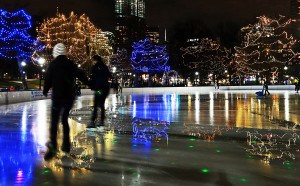Four New Venues Reinventing Boston Live Music
In aftermath of the pandemic's concert-killing shutdown, Boston redefines itself as the city that rocks, all over again.

Photo by Adam Parshall/Crystal Ballroom
On March 11, 2020, burgeoning Dublin post-punk band the Murder Capital burst onto Once Somerville’s stage, riding the tailwinds of rave reviews from the U.K.’s famously fickle music press. Brimming with confidence, lead singer James McGovern gleefully announced, “This is our first-ever U.S. show!” By the end of that month, both the Murder Capital’s American tour and the Highland Avenue club were shut down permanently, thus beginning a dreary year and a half without live music.
When the curtains rose on some of the area’s first post-COVID shows a couple of years later, it was like Christmas morning for music fans. Though Once Somerville and a few other beloved spots had sadly become pandemic casualties, a handful of shiny new venues representing nothing less than a once-in-a-generation live-music renaissance in Boston began opening their doors just as seemingly every act in the world was back on tour.
Even better, these new venues were built by music lovers for music lovers. There were considerations made for artists and guests that many will not recognize even after multiple visits, but suffice it to say that sound, lighting, and sightlines are good, while the petty aggravations that once plagued some venues—like drink and bathroom lines that took you out of the show and bottlenecked entry—have all been solved by design.
Sadly, it was the little guy that took the biggest hit from COVID, and it’s no secret that most of Boston’s new venues are owned by large corporations, and all of the clubs that the lockdown killed were independently owned. But while we remember fondly the 1980s music heyday that birthed Pixies, Mission of Burma, Lyres, and so many other great bands through locally owned venues like the Rat, the Channel, Nightstage, and the semi-legal Thayer Street lofts, we won’t miss the filthy bathrooms, the dance-floor brawls, and the occasional rodent.
Speaking of change, the 18-month musical drought didn’t just bring a glut of new places to listen to live music; it also brought significant changes to the experience itself, as the industry continues to look for ways to increase revenues. A much larger number of artists are now offering VIP access to themselves via exclusive pre-show mini sets and Q&A sessions. Meanwhile, controversial measures like dynamic pricing, a practice by which ticket sellers are able to raise prices algorithmically based on demand, appear to be here to stay. And broadened tiered ticketing now offers access to perks like premium seats, table service, expedited entry, and exclusive merchandise. Bottom line, live music may be getting more expensive, but for the most part, you’re paying more for more.
With that said, let’s check out Boston’s new breed of concert venues.
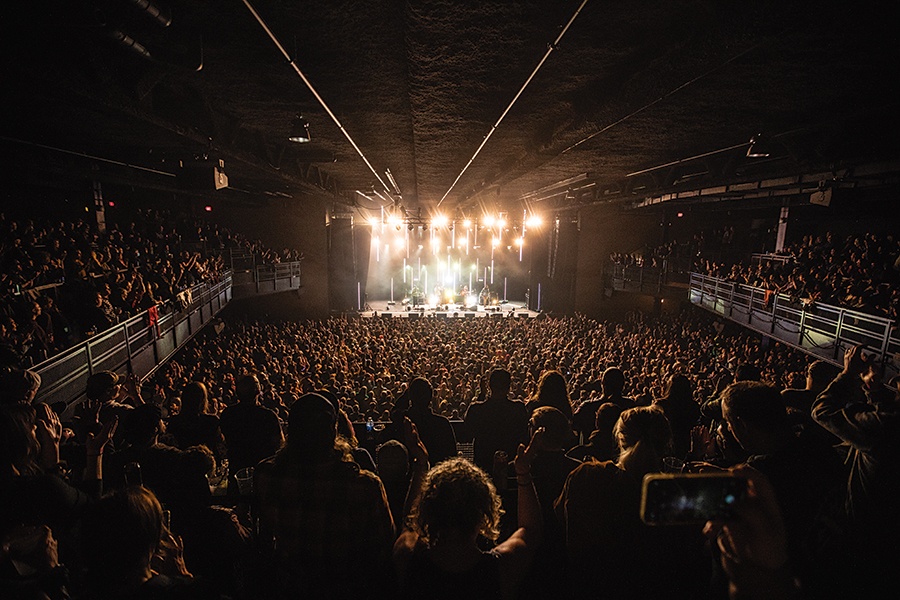
A packed house at Roadrunner during a Billy Strings performance. / Photo by Ben Stas/Roadrunner
Roadrunner
The jury is in on the recently opened Roadrunner from the Bowery Presents team—and the verdict is clear: They got it right. Taking its name from the Modern Lovers song, a.k.a. a love song to Massachusetts, the 3,500-capacity general-admission club across the street from the New Balance World Headquarters is booking breakout artists such as Mitski, Big Thief, and Alvvays, acts that have graduated from their first gigs at Great Scott several years ago and are now the mainstays of SiriusXMU radio and multiple 8-plus-rated Pitchfork reviews.
As with other new venues, the developers of Roadrunner were brought in at the early stages, so design elements such as an angled balcony, deep stage, convenient loading docks, and sizable backstage areas were deeply considered and strategically designed rather than retrofitted. This ensures convenience for the crowd in terms of bar and bathroom locations, incredible sound, and a substantial and well-appointed backstage area with a catering kitchen offering a new level of comfort that will not be lost on bands (or their tour managers). In short, this place will book great artists because artists will want to play here—even if they could stretch and play somewhere slightly larger. Their fans, meanwhile, will want to see them here because the place looks and sounds great.
89 Guest Street, Boston, roadrunnerboston.com.
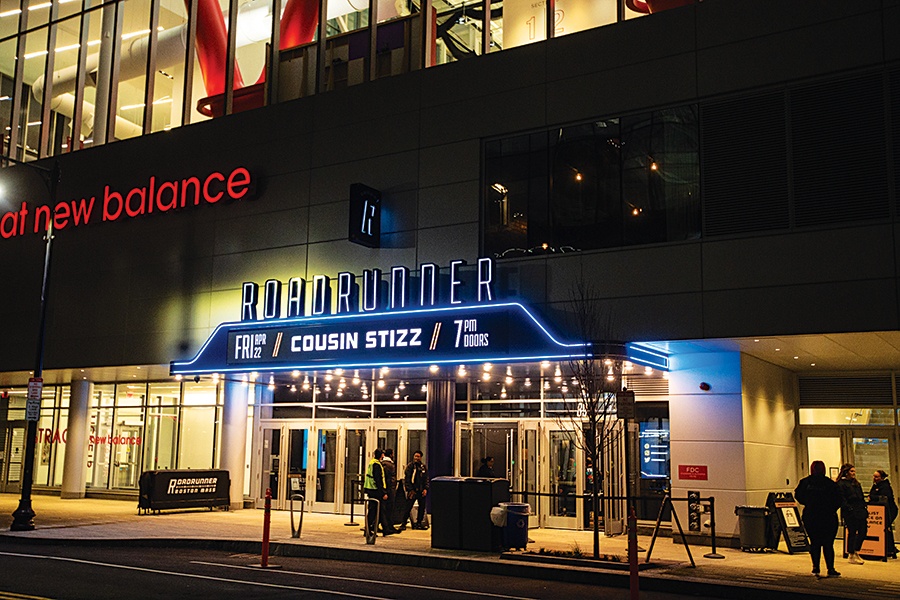
Photo by Ben Stas/Roadrunner
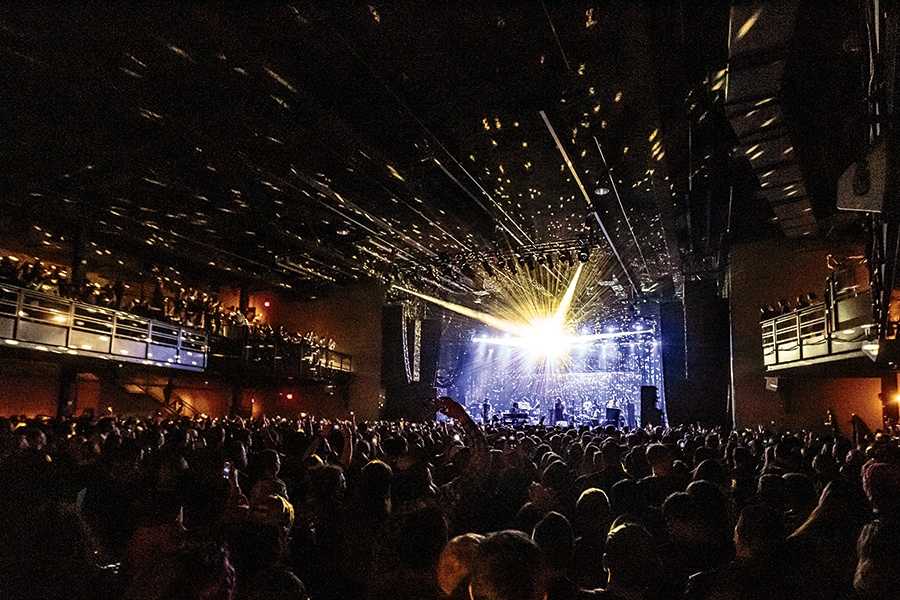
Photo by Ben Stas/Roadrunner
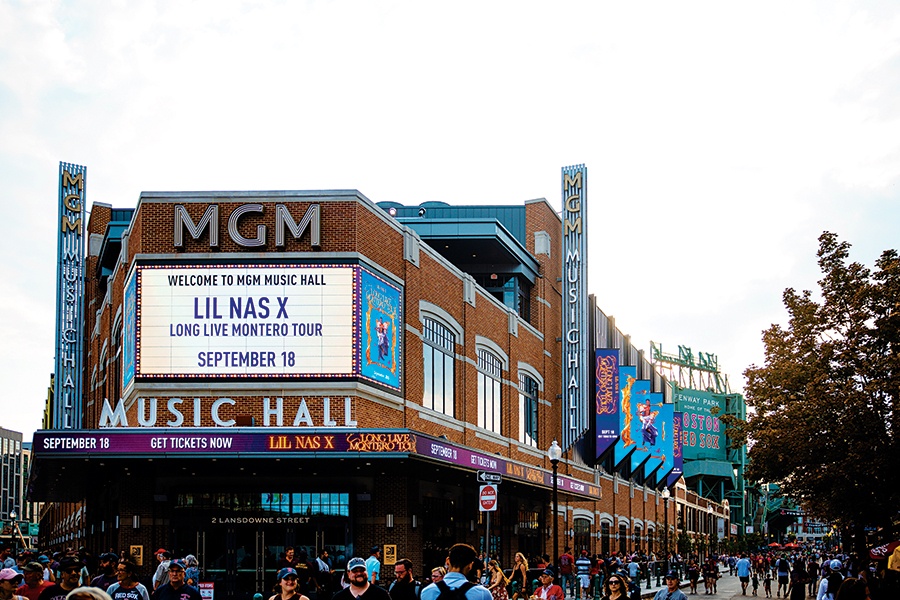
Photo by Aaron Idelson
MGM Music Hall at Fenway
They got it right part two—the Live Nation Entertainment/Fenway Sports Group edition. Referred to in-house as the “anti-amphitheater,” the modern, multitiered 5,000-capacity event space feels half its size thanks to the ingenuity of the building- and sound-design teams. To the great benefit of the paying customer, no seat in the house is more than 110 feet away from the stage, the furthest being the top-right seat on the balcony level. Most nights, the floor is general admission, and if every jackass in the place isn’t holding up their iPhone to prove they were there, even the most vertically challenged of patrons have good sightlines. Wide, well-staffed bars and standing room are available on each level and on the venue’s outdoor roof deck, allowing attendees to grab a drink and take in a breath of fresh air before, during, and after each show.
Built on the triangle-shaped lot that had historically been a Fenway service yard, the venue also offers one of the hallmarks of its baseball-shrine neighbor: ubiquitous advertising and branding placement. But once you register that this will likely be the case in clubs going forward, they soon fade into the background. The venue also offers premium-priced tickets to hang in the Jim Beam Distillers VIP room—a swanky private bar with couches for when you’ve consumed too much of the title sponsor.
2 Lansdowne St, Boston, crossroadspresents.com.
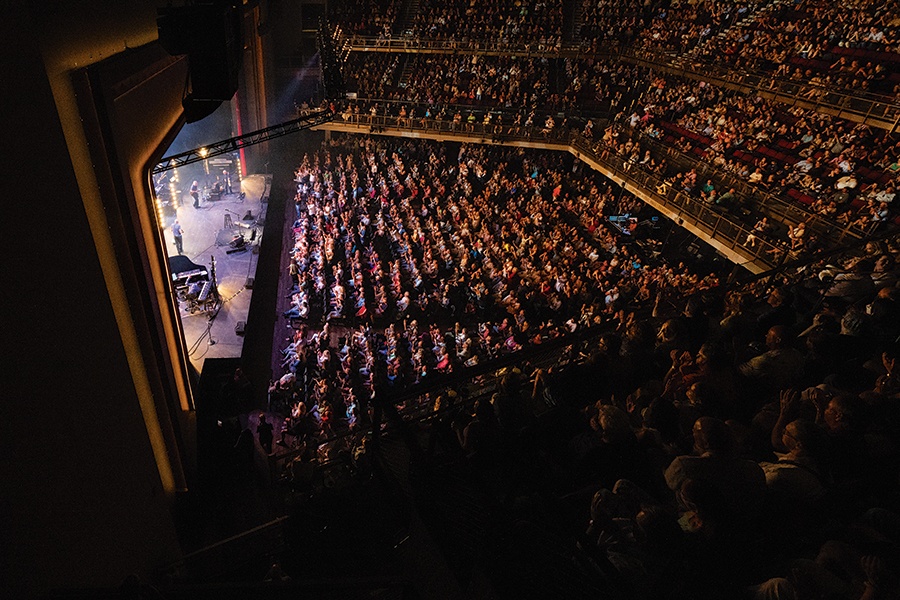
Photo by Rachel O’Driscoll
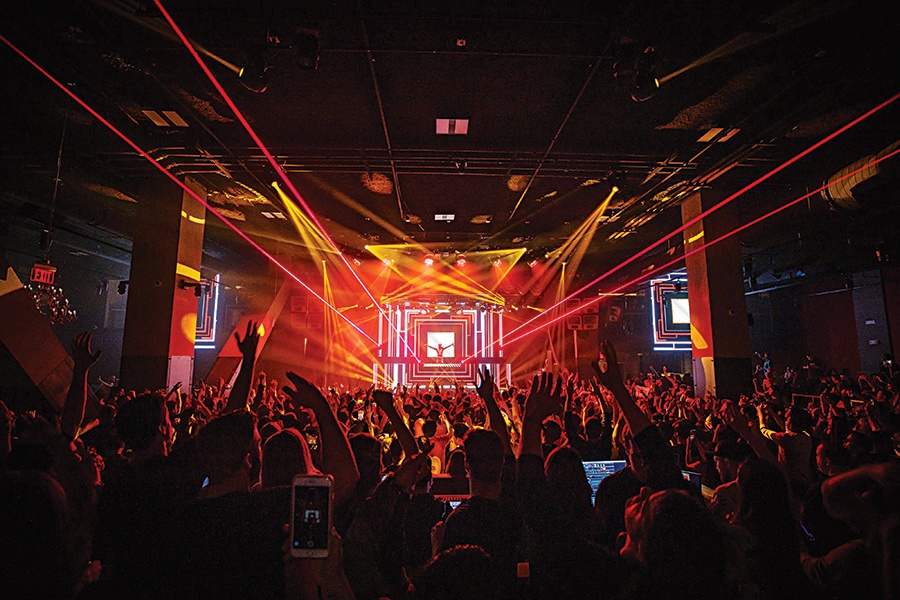
Photo via Big Night
Big Night Live
In the center of yet another newly completed urban transformation project, the Hub on Causeway (more colloquially known as: Holy shit, there’s a mall with an awesome food court at the Garden) is a nightclub that does double duty as a live-music venue. Home to touring DJs such as Gryffin and Armin van Buuren, the venue also plays host to hip-hop, Latin music, metal, and indie acts, with 26 large VIP banquetted tables featuring bottle service at its literal and metaphorical center.
Locally owned by Dorchester natives Ed and Joe Kane along with Randy Greenstein, who partnered with Live Nation for booking, the 2,000-capacity room rises gradually from its stage toward the back of the venue, with a two-tiered general-admission space directly in front of the stage and another along the rear wall. Three bars satisfy a capacity crowd with very little wait. For DJ and EDM sets, the place has a world-class sound system, and the room’s configuration makes all the sense in the world. For Boston, it is the most “at the club” a club can be, and that is its strongest suit.
110 Causeway Street, Boston, bignightlive.com.
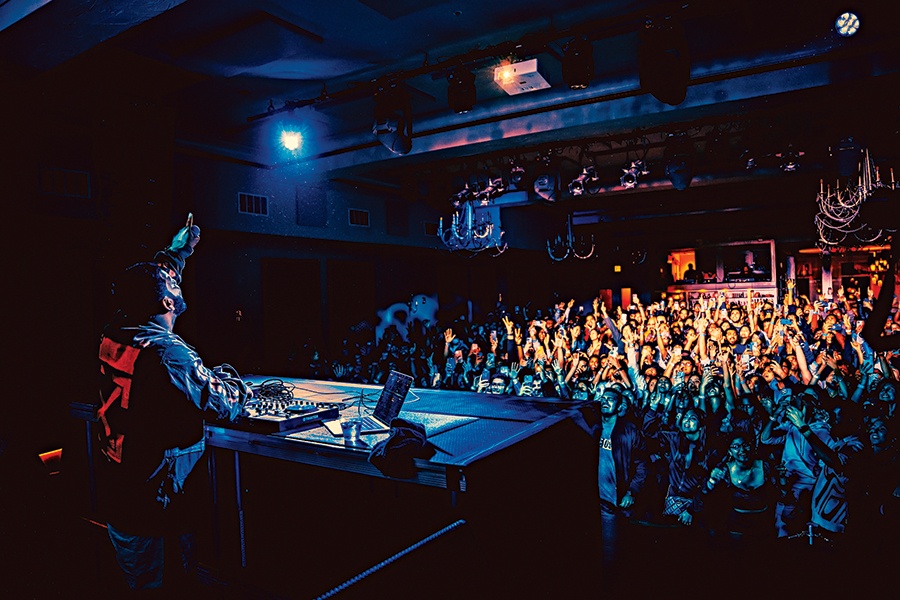
Photo by Adam Parshall/Crystal Ballroom
Crystal Ballroom
The outlier among the new wave of Boston-area live-music venues is the Crystal Ballroom. It’s distinguished in several ways from its newbie peers: It’s in Somerville rather than Boston and is independently owned and operated. Fact is, a couple of the people working at Crystal Ballroom came from Once, and you can feel that DNA in the best possible way. Theater owner Richard Fraiman and creative director Ian Judge, who run the joint, decided that the upstairs of the 1914-built Somerville Theater, which was formerly a ballroom but had been converted into two movie theaters, should be converted back to its original purpose as a ballroom for live music and other events.
That said, the Crystal Ballroom was by no means returned to its original state. Though accessed through a fairly tired vestibule and staircase, the new space looks fantastic and received far more than just a fresh coat of paint. The room holds 500 people and is populated by a state-of-the-art sound system, new bars, and remodeled bathrooms. There are a few high-top tables throughout and a bar at the back that more than satisfies the crowd. The stage is a few steps down from the main floor, with a dance floor/general-admission area directly in front of it. Like Once and Johnny D’s, Crystal Ballroom books a mélange of indie rock, Americana, and world-music acts, so happily, the independent spirit is still alive and well locally.
55 Davis Square, Somerville, crystalballroomboston.com.
The COVID Casualties (RIP)
Three old favorites that are gone but not forgotten.

Great Scott in 2016. (Photo by Keith Bedford/The Boston Globe via Getty Images)
Great Scott
Great Scott was what would’ve happened if CBGB went to BU and decided to stay after graduation: It booked phenomenal bands before you’d heard of them, you had to walk past the stage to get to the (much cleaner than CB’s) bathroom, and there was no backstage per se, so you wound up drinking with or buying merch from band members before their set. With any luck, we won’t have to miss Great Scott for too long. The club’s leadership is currently looking for a new location.
ONCE
This ballroom was a charmingly substance-over-style joint that had formerly been a Knights of Columbus Hall (proximate to Winter Hill, no less), a theater, and a bowling alley. In fact, given the upstairs lounge’s dedication to authentic 1970s period detail, you half expected an old-school Italian wedding to break out in the middle of a Titus Andronicus set. It lives on as a producer of virtual and live events with the club’s signature dedication to local and national acts.
Milky Way Lounge
Though it eventually moved beyond its live-music roots, we would be remiss not to provide a suitable elegy for J.P.’s Milky Way Lounge, which continued the dance party long after it shed its Hyde Square address and candlepin lanes.
First published in the print version of the January 2023 issue with the headline, “The Future of Live Music Is Now.”
